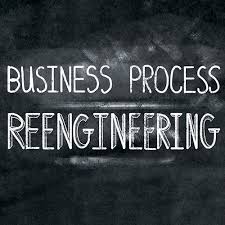A while ago, I was talking with a distinguished executive working in financial services about the types of projects we are working on. After I covered a brief summary, he exclaimed “Process Improvement! People still do that? Didn’t that all go away in the ‘90s?”
while ago, I was talking with a distinguished executive working in financial services about the types of projects we are working on. After I covered a brief summary, he exclaimed “Process Improvement! People still do that? Didn’t that all go away in the ‘90s?”
I have to admit, as sure as that HBR article just over 34 years ago by Michael Hammer, Reengineering Work: Don’t Automate, Obliterate (FROM THE JULY–AUGUST 1990 ISSUE) sparked my interest in this area and sent a lightning bolt of perspective change through a wide variety of organizations, I was wondering if there was another article or trend that somehow I missed that no longer made being efficient relevant.
From our experience, working with some of the fastest growing companies, as well as progressive higher education institutions, looking at how to make or keep an organization focused on efficiency, quality, customer satisfaction and profitability has never been more relevant. But, to be fair, a lot of things have changed in the past 34+ years.
From TSI’s perspective, here are the top 5 things that have happened to process improvement over the years:

- It has evolved and now incorporates User Experience (UX), Customer Experience (CX), Transformation or another synonym. Plenty of process definition and analysis is still being done, but it’s done with a greater awareness of what the total experience is. Further, many organizations are more holistic, looking not just at processes (or operations) but people, culture, technology, strategy, metrics and a number of other dimensions. This is one of my favorite ways that PI has evolved.
- Tightly coupled with ERP, CRM and other major systems – years back, many organizations optimistically and naively assumed their new ERP/CRM would fix their processes automatically. “We’ll just implement the same processes that (insert Software Product/Vendor name) implemented in (insert similar company name) and we’ll be fine”. Sadly, these organizations learned this is a fallacy and implementing an ERP without looking at processes is a recipe for disaster or just wasting a lot of time and money.
- Process Renovation – Some organizations are taking a fresh look at the processes that have been re-engineered 10-20 years ago. In some cases, as their business model has changed with acquisitions, divestitures etc. and they realized that it is time to take another hard look at how they operate. Just because you did this in 2005, does not mean you shouldn’t do it again.
- Nothing – believe it or not, some organizations missed that wave 34 years ago and still haven’t taken a fresh review of how they operate. Unfortunately in many industries such as retail, publishing, higher education, pharma, high technology manufacturing and many others, we have seen the peril of failing to proactively streamline processes, systems and customer experiences.
- Lean/Continuous Improvement/Six Sigma Culture – some organizations have reaped the rewards and feel strongly that a periodic review of how they operate is one of the most differentiating characteristics in the marketplace. They strive to be “Operationally Excellent” in all aspects of their business from how they go to market, develop products/services, hire new employees, pay vendors, service customers.
Your Call to Action
In summary, after 34 years, this notion of “process re-engineering” that was set in motion by an article describing a project at Ford Motor Company is alive and thriving. Granted, this is taking on more adaptive and holistic dimensions, but I would ask you to contemplate the following:
When is the last time you reviewed how your company is to do business with through the eyes of your customers? When is the last time you analyzed these areas? When is the last time you had an outsider who is committed to telling the truth, assess your organization?
TSI (transforming.com) is a leading performance improvement, process re-engineering, technology strategy and organization change management consulting firm based in Chicago. We collaborate with our progressive growth-oriented and higher education clients to define and implement recommendations that help our clients become more efficient, cost effective, higher quality and more customer focused. Dan Feely is the founder of TSI and can be reached at dfeely@transforming.com
